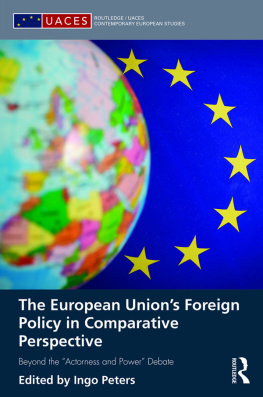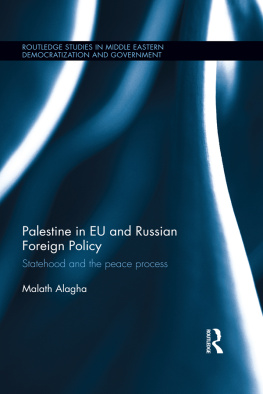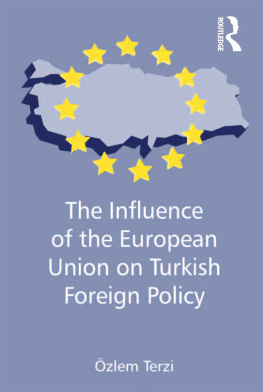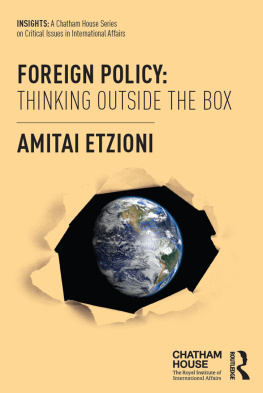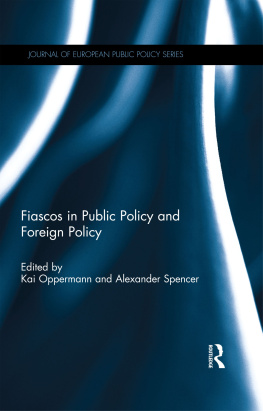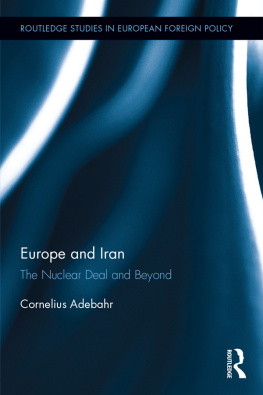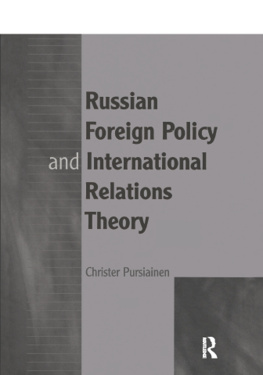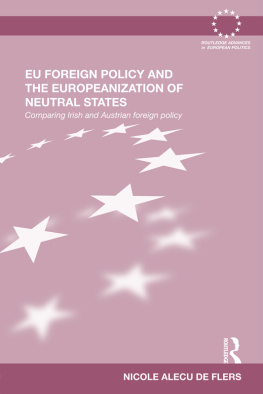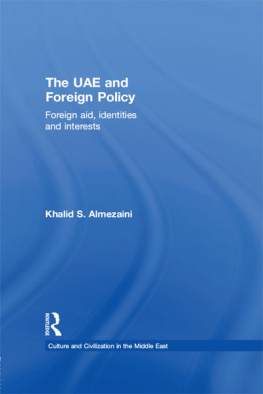The European Unions Foreign Policy in Comparative Perspective
This ground-breaking volume provides a new perspective on the EUs foreign policy and offers a reconstruction of EU research that extends beyond narrow-minded concepts of power and actorness. Focusing on two intertwined research questions, it presents a more sustainable base for studying EU foreign policy:
- What is the EUs foreign policy quality in terms of actorness and power compared to other types of actors in international relations and global politics?
- What factors influence the EUs foreign policy performance in comparison to states and international organizations?
This guiding principle and application of a grounded theory or heuristic case study approach allows the book to deliver a structured comparative analysis of EU foreign policy, comparing findings across policy fields, different legal foundations and respective policy modes of governance.
This book will be of key interest to students and scholars of European Union studies, European Union foreign policy studies, international relations and security policy studies.
Ingo Peters is Associate Professor of Political Science at the Freie Universitt Berlin and Executive Director of the Center for Transnational Relations, Foreign and Security Policy, Germany.
This welcomed volume contains a systematic, comprehensive and well-argued comparative analysis of a highly topical issue in EU studies, at the same time providing a welcomed antidote to current pessimism regarding the EUs role in world politics.
Emeritus Senior Professor Walter Carlsnaes,
Uppsala University, Sweden.
The edited book gently chips away the theory beyond merely looking at the power and actorness debates to reveal how the EU actually performs across a range of foreign policy issues by taking a comparative perspective that allows one to analyse between the declatory and operational European Union. Taking a case study approach across the three dimensions of governance/regulatory frameworks; peace and state building and crisis management and missions, it makes for compelling reading as it offers an insightful audit as it unpacks the foreign policy performance of the EU by drawing attention to challenges for collective action framed between normative discourses and interest articulation. It is informative and relevant for the practitioner and the researcher.
Professor Ummu Salma Bava, Centre for European Studies,
Jawaharlal Nehru University, India.
Routledge / UACES Contemporary European Studies
Edited by Federica Bicchi, London School of Economics and Political Science, Tanja Brzel, Free University of Berlin, and Mark Pollack, Temple University, on behalf of the University Association for Contemporary European Studies
Editorial Board: Grainne De Brca, European University Institute and Columbia University; Andreas Fllesdal, Norwegian Centre for Human Rights, University of Oslo; Peter Holmes, University of Sussex; Liesbet Hooghe, University of North Carolina at Chapel Hill, and Vrije Universiteit Amsterdam; David Phinnemore, Queens University Belfast; Ben Rosamond, University of Warwick; Vivien Ann Schmidt, University of Boston; Jo Shaw, University of Edinburgh; Mike Smith, University of Loughborough and Loukas Tsoukalis, ELIAMEP, University of Athens and European University Institute.
The primary objective of the new Contemporary European Studies series is to provide a research outlet for scholars of European Studies from all disciplines. The series publishes important scholarly works and aims to forge for itself an international reputation.
1.The EU and Conflict Resolution
Promoting peace in the backyard
Nathalie Tocci
2.Central Banking Governance in the European Union
A comparative analysis
Lucia Quaglia
3.New Security Issues in Northern Europe
The Nordic and Baltic states and the ESDP
Edited by Clive Archer
4.The European Union and International Development
The politics of foreign aid
Maurizio Carbone
5.The End of European Integration
Anti-Europeanism examined
Paul Taylor
6.The European Union and the Asia-Pacific
Media, public and elite perceptions of the EU
Edited by Natalia Chaban and Martin Holland
7.The History of the European Union
Origins of a trans- and supranational polity 195072
Edited by Wolfram Kaiser, Brigitte Leucht and Morten Rasmussen
8.International Actors, Democratization and the Rule of Law
Anchoring democracy?
Edited by Amichai Magen and Leonardo Morlino
9.Minority Nationalist Parties and European Integration
A comparative study
Anwen Elias
10.European Union Intergovernmental Conferences
Domestic preference formation, transgovernmental networks and the dynamics of compromise
Paul W. Thurner and Franz Urban Pappi
11.The Political Economy of State-Business Relations in Europe
Interest mediation, capitalism and EU policy making
Rainer Eising
12.Governing Financial Services in the European Union
Banking, securities and post-trading
Lucia Quaglia
13.European Union Governance
Efficiency and legitimacy in European commission committees
Karen Heard-Laurote
14.European Governmentality
The liberal drift of multilevel governance
Richard Mnch
15.The European Union as a Leader in International Climate Change Politics
Edited by Rdiger K. W. Wurzel and James Connelly
16.Diversity in Europe
Dilemmas of differential treatment in theory and practice
Edited by Gideon Calder and Emanuela Ceva
17.EU Conflict Prevention and Crisis Management
Roles, institutions and policies
Edited by Eva Gross and Ana E. Juncos
18.The European Parliaments Committees
National party influence and legislative empowerment
Richard Whitaker
19.The European Union, Civil Society and Conflict
Nathalie Tocci
20.European Foreign Policy and the Challenges of Balkan Accession
Sovereignty Contested
Gergana Noutcheva
21.The European Union and South East Europe
The Dynamics of Europeanization and Multilevel Governance
Andrew Taylor, Andrew Geddes and Charles Lees
22.Bureaucrats as Law-Makers
Committee Decision-Making in the EU Council of Ministers
Frank M. Hge
23.Europeanization and the European Economic Area
Icelands participation in the EUs policy process
Johanna Jonsdottir
24.The Cultural Politics of Europe
European capitals of culture and the European Union since 1980
Kiran Klaus Patel
25.European Integration and Transformation in the Western Balkans
Europeanization or business as usual?
Arolda Elbasani
26.European Union Constitutionalism in Crisis
Nicole Scicluna
27.Transnationalization and Regulatory Change in the EUs Eastern Neighbourhood
Julia Langbein
28.Lobbying in EU Foreign Policy-making
The case of the Israeli-Palestinian conflict
Benedetta Voltolini
29.War and Intervention in the Transnational Public Sphere
Problem-solving and European identity-formation
Cathleen Kantner
30.The European Unions Foreign Policy in Comparative Perspective
Beyond the Actorness and Power Debate
Edited by Ingo Peters
31.The Formulation of EU Foreign Policy

